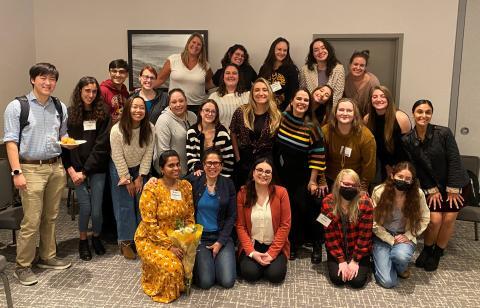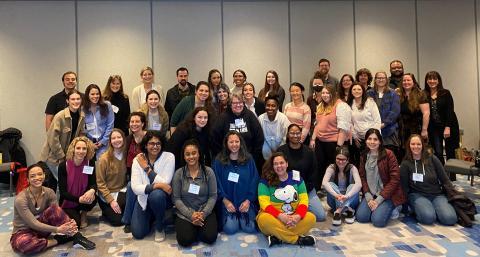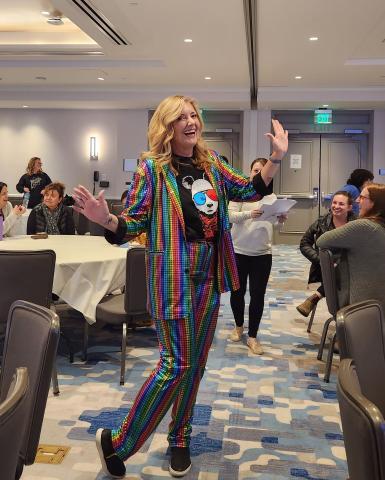
MA in Counseling Faculty and Students Gather for Winter 2023 Residency
Last month, Palo Alto University (PAU) Master’s in Counseling students from around the world gathered for a week-long clinical intensive training at the Sonesta Hotel in Milpitas, California. Due to the pandemic, clinical intensives have been virtual since 2020, making this the first time that students and faculty have met in person in more than three years. With 140 students and 14 faculty and staff members in attendance, this was the largest PAU clinical intensive to date and the first one to use a residency model (at a hotel), giving the event a professional conference feel.
“Classes are held virtually, so when students arrived it was the first time they had met their classmates in person. They were running up to each other and hugging, some of them were in tears because they were so excited to see each other. It was really sweet and exciting to watch,” said Kelly Coker, PhD, Professor of Counseling, Faculty Director of Assessment and Student Learning Outcomes, and Residency Planning Committee member. “This is my favorite class to teach, I love it.”
The week-long intensive offered both Residency I and Residency II training. Residency I, taken by first-year students, serves as the capstone to the Counseling Skills course. This course focuses on basic skills and the fundamentals of establishing the counselor-client relationship, such as how to sit with a client and reflect meaning, develop in-take forms, and use open questions to get information. Students learn these skills in weekly classes via Zoom, then practice these skills in person during Residency I.
Residency II, anchored to the Crisis and Trauma class taken in the second year, focuses on advanced counseling skills, such as integrating theory, goal setting with clients, and risk assessment of conditions such as suicidal ideation and substance abuse.
Residencies I and II are offered simultaneously, twice per year, at the end of the winter and summer terms. Master’s students must pass both residencies before starting an internship where they are placed in agencies, schools, or hospitals to work with real clients.

What Happened During the Week?
Master’s student Jason Hodson is in his first year of the program and stayed at the Sonesta Hotel for his Residency I training.
“It was very surreal to see everyone in my cohort on that Monday morning,” said Hodson. “For six months, I had been developing deep relationships with them via Zoom, and when I saw them in person, I felt starstruck. Especially with the professors whom I have so much respect for—they are masters of their craft and such great teachers. I can’t say enough about how great the PAU professors are. It was a real treat to be around them in person.”
Every morning, all students and faculty gathered for large group activities and counseling demonstrations. In the afternoons, students worked in small groups for more intensive training sessions where they role-played counseling sessions with other members of their cohort. Faculty members were assessing effective demonstration of specific counseling skills as well as professional disposition so that students feel prepared for working with real clients during their internships.
“During residency, we encourage students to take risks, try things that they are not sure are going to work because if they don’t, they have faculty members there to help them learn from their mistakes,” said Coker. “These learning experiences are crucial to get students ready to work with real clients in practicum.”
Hodson believes his residency experience will make him a better counselor because it challenged him enough to get him out of his comfort zone, but not too much to elicit anxiety. He also felt comfortable enough to take risks that he wouldn’t have taken with real clients and learn what works and what doesn’t.
“When I was offering counseling during the role-plays, I listened to my gut and did what I thought was right in the moment. I was able to take those risks because I knew that if I was going to mess it up, now was the time to do it,” said Hodson. “I feel like I have the instincts to be a good counselor, and after the residency, I now have the skills that go along with those instincts.”
During the week, talks and support were given by members of the PAU student support team, such as Provost Erika Cameron, Ana Castrillo, and Diana Hernandez. Other staff members in attendance, Sarah Everly, Lina La, and Meg Ables, took care of nametags, QR codes, food and drink, and other logistics to give the event a professional conference feel. For future residencies, Coker plans to invite additional PAU staff members to offer support, such as providing financial aid information or visa information for international students.

Time for Fun
Coker said the Residency Planning Committee not only focused on the curriculum for the week but also discussed activities that would create a fun, engaging, and memorable experience for the students. There were several lighthearted activities throughout the week, such as a faculty versus student trivia night, spontaneous dance parties, and entertaining role-plays put on by faculty members.
“We all need connection right now, and connection is what we provided with this residency. We work hard to provide an engaging environment in Zoom, but we also know there is no substitute for being in person, putting your arms around someone you care about, to give someone a pat on the back,” said Coker. “Due to all of the engaging activities throughout the week, the faculty members also had a lot of fun together. Students kept saying, ‘We can tell how much you all like each other,’ and that’s such a great model.”
On the final morning, cohorts shared with the large group their biggest takeaway. A couple of groups shared their learnings through entertaining dances, another group sat in silence to show how silence can be used as a tool, and another group stood up holding hands with each student saying, “I am enough” in their native language. The faculty wanted to end the week on a high note, so they offered a surprising flash mob dance, which prompted many students to jump up and join in.
“We’ve gotten so many emails saying, ‘Thank you so much. This is the most amazing thing I’ve done at PAU. It helped me feel a part of the University’,” said Coker.
As a closing activity, Hodson’s cohort sat in a circle, and each student shared the most meaningful thing they learned from the week.
“My answer was short and sweet, ‘I belong’,” said Hodson. “I have so much imposter syndrome and self-doubt. Before residency, I had asked myself, ‘Am I doing the right thing?’ But this week solidified my belief that I am absolutely in the right place doing the right thing.”




